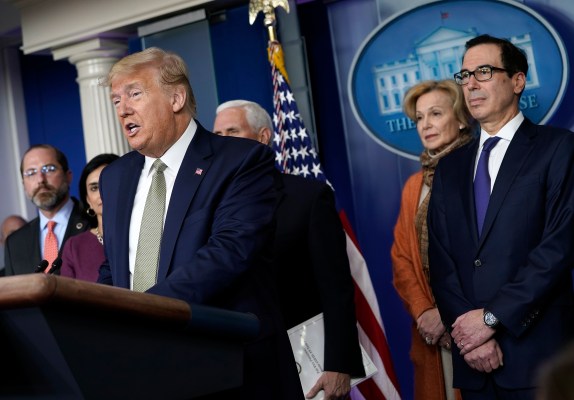The FCC has denied a request that it investigate and take action on a broadcast the petitioners allege has made material and deadly contributions to the spread of COVID-19: President Trump’s frequent press conferences.
In a petition filed with the FCC in late March, media watchdog Free Press wrote that the briefings were so full of incorrect and misleading information that the communications regulator had a duty to at the very least investigate and report on the broadcasts:
Of particular and urgent concern is the deadly disinformation broadcast on television stations across the country in the form of context-less coverage of President Donald Trump’s press conferences and other statements…
We urge the FCC to conduct an urgent examination into the extent to which broadcasters have aired hoaxes and false or misleading information about COVID-19, and immediately issue an emergency policy statement or enforcement guidance recommending that broadcasters prominently disclose when information they air is false or scientifically suspect.
It’s a big ask that a federal agency should step in and say the president is perpetrating a hoax on the country. And while the accuracy of the information in the briefings is certainly questionable — for instance the president’s repeated assurances that the pandemic “will disappear,” that there are plenty of “beautiful” tests, and that the unproven chloroquine is effective against the virus — the FCC determined that it was not advisable or possible to restrict their broadcast.
A simple “no” with the requisite technical details probably would have sufficed, but the FCC opted to post on its front page a more lengthy takedown of the Free Press petition. If that seems a bit excessive, recall that Free Press has been a frequent and effective critic of the FCC, calling out a nonsensical economic analysis at the heart of the agency’s justification for rolling back net neutrality, and more recently exposing an embarrassing error that inflated broadband deployment numbers in the country by millions.
So perhaps there is something more to the decision to perform a more meticulous dismantling of Free Press’s petition. All the same, the FCC’s response provides valuable information on why the agency both can’t and shouldn’t take the actions suggested:
The Commission does not—and cannot and will not—act as a self-appointed, free-roving arbiter of truth in journalism. Even assuming for the sake of argument that Free Press’s assertions regarding any lack of veracity were true, false speech enjoys some First Amendment protection, and section 326 of the Communications Act, reflecting First Amendment values, prohibits the Commission from interfering with freedom of the press or censoring broadcast communications.
…The Commission has historically regulated the broadcast of dangerous hoaxes. But the Commission has applied this rule narrowly in light of the substantial First Amendment concerns involved with the federal government policing the content of broadcast news.
At this moment, broadcasters face the challenge of covering a rapidly-evolving, national, and international health crisis, in which new information—much of it medical or technical in nature and therefore difficult to corroborate or refute in real time—is continually revealed, vetted, and verified or dismissed.
Under such circumstances, it is implausible, if not absurd, to suggest that broadcasters knowingly deceived the public by airing these press conferences or other statements by the President about COVID-19.
Instead, the FCC suggests that the broadcast of incorrect information merely presents a new opportunity for journalists to add context and correction to the record. As it concludes, with a parting shot at Free Press:
We leave to the press its time-honored and constitutionally protected role in testing the claims made by our political leaders—as well as those made by national advocacy organizations.
The full text of the FCC denial (PDF) is an educational read if, like many these days, you wonder about the potential of a government entity like the FCC stepping in to control the airwaves in a time of crisis.

